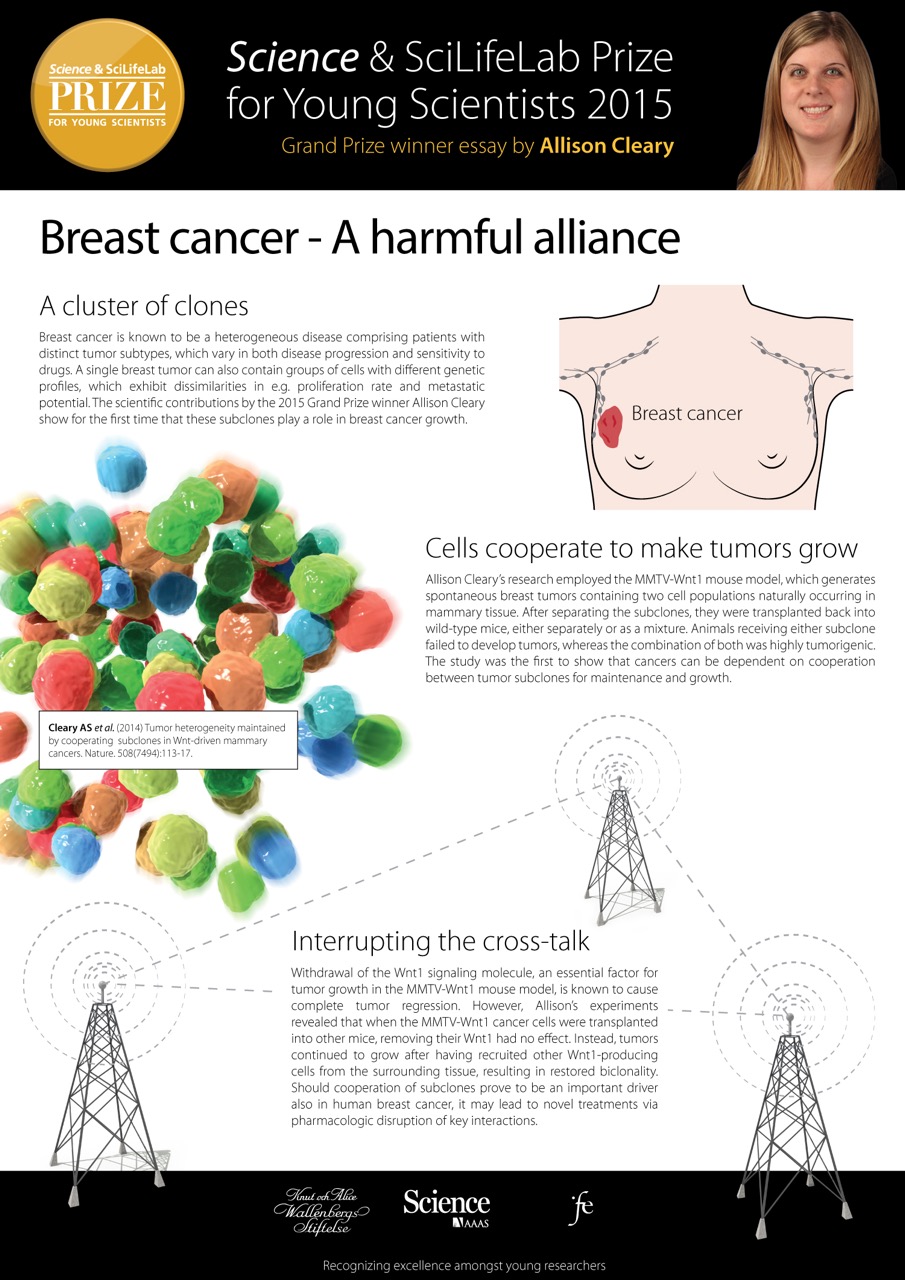Breast cancer dependent on cell cooperation to grow
– discovery awarded international science prize
Researcher Allison Cleary has, for the first time, demonstrated that different types of tumor cells cooperate in the development and growth of breast cancer. For these findings, she is awarded the Science & SciLifeLab Prize for Young Scientists and thereby receives 30,000 USD as well getting published in Science magazine.
A breast cancer tumor often comprises several types of cells, clones, with distinct genetic profiles, growth rates and ability to create metastases. In the awarded research, Allison Cleary used the mouse model MMTV-Wnt1, which spontaneously develop breast tumors, to explore the relationship between the different cell clones. She isolated two cell cones from MMTV-WNt1 tumors, separated them for each other and transplanted them into regular mice.
Some mice received one of the two cell clones, whilst others were given a mixture of both. Animals receiving either clone failed to develop tumors, whereas the combination was highly tumorigenic. Hence, the study was the first to show that cancers can be dependent on cooperation between tumor subclones for maintenance and growth.
New treatment strategies
If the production of Wnt1 is halted in MMTV-Wnt1 mice, the tumors typically stop growing. However, when Allison Cleary transplanted MMTV-Wnt1 cancer cells into other mice and removed their Wnt1, the tumors continued to develop. In fact, they had managed to recruit other Wnt1-producing cells from the surrounding tissue to restore the biclonality needed for growth. The experiments show that cooperation between different cell clones can be essential for tumor progression. Should collaborations like these prove to be important also in human breast cancer, disrupting key interactions may be a novel treatment strategy for the disease.
Prize for young scientists
Allison Cleary made the discoveries while working at her doctoral thesis at Pennsylvania State University College of Medicine, USA. She is now receiving the 2015 Grand Prize of Science & SciLifeLab Prize for Young Scientists – an international annual award established to promote promising young researchers early in their career. The prize is funded by SciLifeLab in collaboration with Science and with the kind support of Knut and Alice Wallenberg Foundation.
“I am so unbelievably honored to be named one of the winners of the Science and SciLifeLab Prize,” said Allison Cleary. “I am excited for the type of exposure that this prize will bring to my research, as well as for the chance to make new connections with other investigators around the world.”
For recent PhD graduates
Those who wish to contend for the prize should have earned their doctoral degree within the last two years and write a scientific essay about their PhD project. The research should be carried out in one of the following categories: Cell and Molecular Biology, Ecology and Environment, Genomics and Proteomics, and Translational Medicine. The essay is judged by a group of independent specialists and editors from the journal Science. Four category winners are selected and one of the four is then appointed the Grand Prize winner, who is awarded 30,000 USD and gets their essay published in Science magazine. Each of the category winners receives 10,000 USD and will have their essays published online at sciencemag.org.
“I am truly impressed with the awardees’ accomplishments and look forward to meeting them in Stockholm soon.” Said Olli Kallioniemi, Director of SciLifeLab. “After three years the prize is now fully established and we are excited to continue rewarding young scientists in the coming years.”

The other three category winners of 2015 are:
- Adam Ford, awarded for his essay in the category Ecology and Environment: “The Mechanistic Pathways of Trophic Interactions in Human-Occupied Landscapes”
- Johannes Scheid, awarded for hos essay in the category Translational Medicine: “HIV Specific B cell Response in Patients with Broadly Neutralizing Serum Activity”
- Ludmil Alexandrov, awarded for his essay in the category Genomics and Proteomics: “Understanding the Origins of Human Cancer: Mutational Signatures”
Award ceremony in The Hall of Mirrors
All four prizewinners will receive their endowments, as well as unique trophy at a banquet in The Hall of Mirrors at Grand Hôtel in Stockholm – the original venue of the Nobel Prize festivities.
On December 9, SciLifeLab in Uppsala organizes an open lecture featuring the 2015 winners and the Editor-in-Chief of Science magazine. For more information, please contact Eva Molin: eva.molin@scilifelab.uu.se.
For further information about the prize, visit http://scienceprize.scilifelab.se/
or contact Susanna Appel: susanna.appel@localhost.




